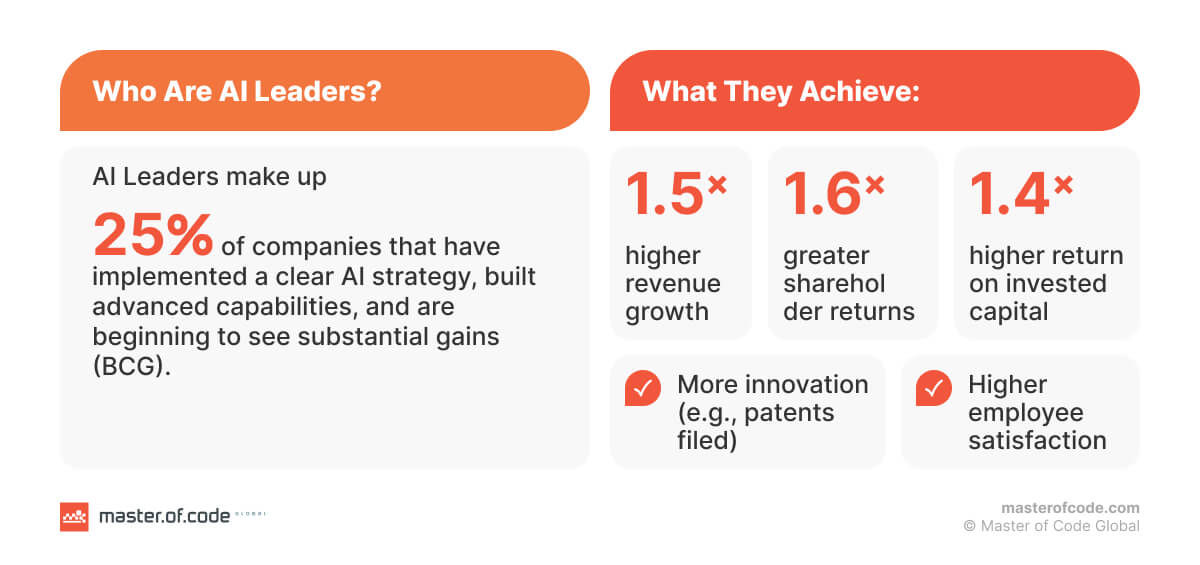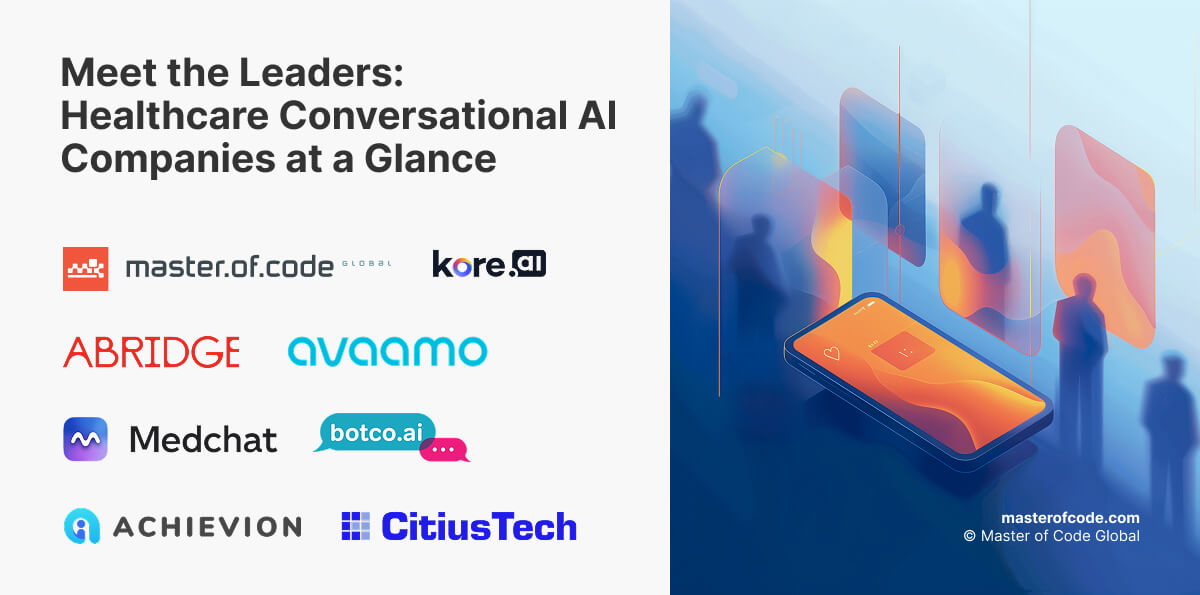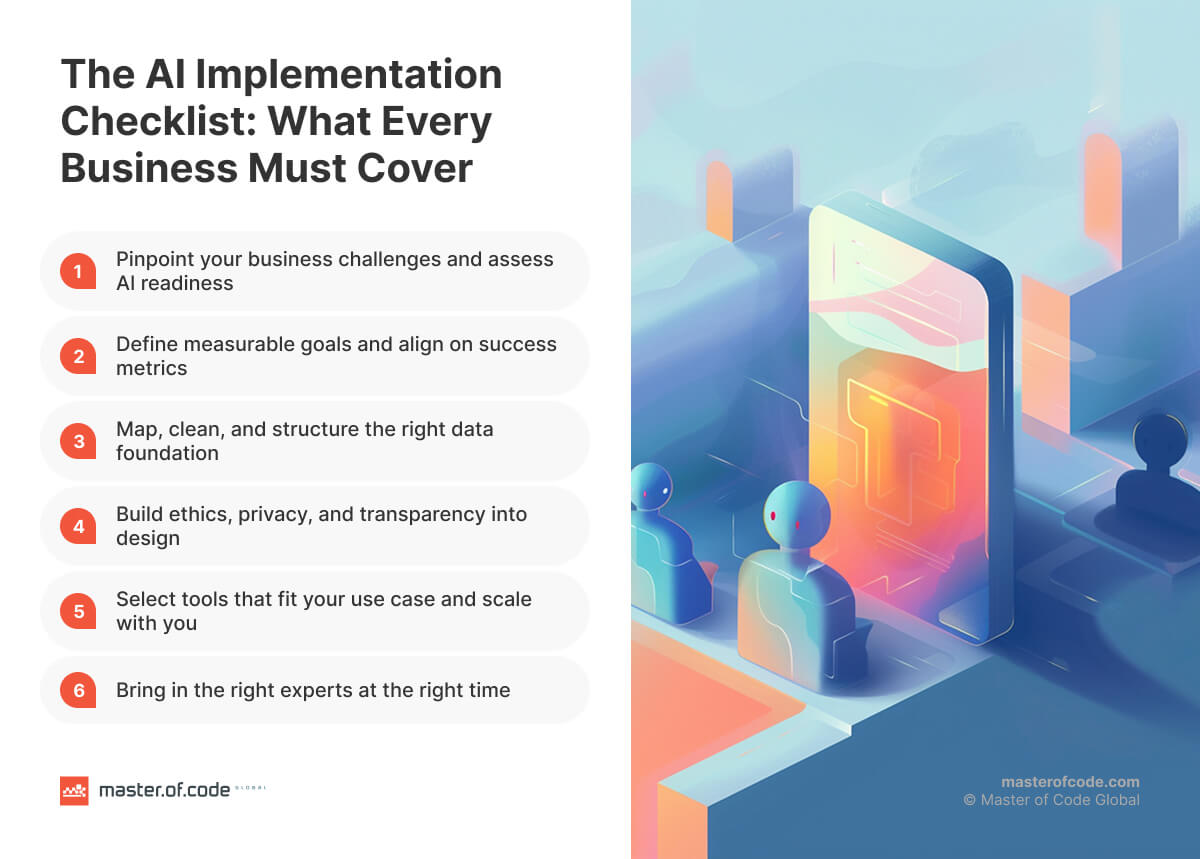“Healthcare is a right, not a privilege.”
It’s a line we’ve heard countless times from politicians and campaigners. But how true is it, really? In practice, the gap is still terrifying. According to the World Bank and WHO, half the world lacks access to essential health services. Worse—every year, 100 million people are pushed into extreme poverty due to medical expenses.

Many claim that modern tech, especially artificial intelligence, could help close this gap. And while that’s a big promise, AI is now proving its value, from simple appointment scheduling and symptom checks to interpreting X-rays and assisting surgeons mid-operation.
It’s no surprise that healthcare ranks among the top industries adopting this technology. In fact, 63% of organizations are already using it, with another 31% actively testing solutions, as per Nvidia.
So, where do they start? With the right partner.
If you’re looking for one, this list of healthcare conversational AI companies is a solid place to begin. We’ve highlighted 8 providers that stand out for their ratings, real-world results, and domain-specific expertise. Take a look—and see which one fits your needs best.
Table of Contents
How We Selected These Companies
Not every vendor made the cut. We went past the headlines to see who’s actually building tools that work in real clinical environments—whether it’s a plug-and-play platform or a fully custom development.
Here’s what we looked for:
- Clear focus on healthcare, not just “all industries”
- HIPAA compliance built into the core
- Real-world deployments, not just polished demos
- Flexibility to adapt to different provider needs
- Human-like conversational flows that build trust
- Multiple language compatibility and accessibility
- Integration capabilities with EHRs or CRMs
- Scalable architecture, no matter the org size
- Transparent business models and delivery terms
- Positive reputation across industry sources
Whether you’re a hospital, healthtech startup, or virtual care provider, these companies offer the kind of depth and reliability worth your time. Let’s take a closer look at who’s making waves in this space.
10 Best Healthcare Conversational AI Companies

Master of Code Global
- Type: Custom solutions provider
- Key services: Conversational AI, medical chatbots, GenAI agents, voice applications, clinical analytics, virtual assistants, care coordination platforms, and others
- Integrations supported: Epic, Cerner, MEDITECH, Allscripts, Athenahealth, and others through custom connectors
- Solutions built: Medication adherence companion (43% drop in tickets), cancer awareness bot (89 cancer types covered), PHI-compliant proactive messaging assistant, internal chatbot for pharma company managers, hospital facility platform (15x revenue growth), AI concierge chatbot & intelligent, multi-channel AI assistant.
- Compliance & security: HIPAA, GDPR, ISO 27001, data anonymization, PII redaction, access control, encryption, penetration testing
Master of Code Global delivers custom, enterprise-grade AI for healthcare—made to fit your workflows, data, and compliance needs. Their proprietary LOFT framework is stated to reduce setup time by 43%, trim pre-MVP costs by 20%, and enable 3x faster support. From optimizing appointment flows and automating medical documentation to improving chronic disease management and surfacing insights from unstructured clinical data, their solutions tackle a wide spectrum of healthcare challenges with precision and adaptability.
Abridge
- Type: Generative AI platform for clinical communication
- Key features: Multiple care settings, multi-specialty, multilingual, integrated workflows
- Compliance & security: Single sign-on, custom governance controls, analytics and reporting, HIPAA, secure cloud, encrypted data
- Impact reported: 78% drop in cognitive load, 90% of clinicians give more undivided attention, 53% improvement in professional fulfillment, 86% of practitioners do less after-hours work
Abridge provides an AI-powered platform that captures and converts clinician-patient conversations into structured clinical notes, directly within EHR. Designed for large healthcare systems, it serves over 50 specialties and enables multilingual documentation across care facilities. It has been adopted by institutions such as Mayo Clinic and Kaiser Permanente, but like many in the space, long-term results at scale is still being evaluated.
Scopic
- Type: Custom AI software development company
- Key services: Custom healthcare software, telemedicine and telehealth web applications, EHR systems, patient portals, AI diagnostics, conversational AI, Chatbot development, medical imaging, teleradiology, dental and orthodontic software, clinical workflow automation
- Integrations supported: EMR systems, legacy healthcare platforms, custom API integrations for existing clinical infrastructure
- Solutions built: OrthoSelect AI-powered orthodontic platform (deep learning tooth segmentation, automated clinical workflows, optimized bracket placement, automated scan correction), telemedicine platforms, electronic health records systems, medical imaging solutions, & patient management portals
- Compliance & security: HIPAA, GDPR, data encryption, privacy protection, access control, secure cloud infrastructure, regulatory standards adherence
Scopic is a global AI software development company with 20 years of experience building custom digital solutions across diverse sectors and particularly distinguished by their high expertise healthcare division. With full 8-step development workflow, Scopic delivers enterprise-grade AI tailored to the rigid compliance needs of medical environments. Their results driven approach is proven to reduce clinical study recruitment time by 75% and boost patient qualification rates to 91%. From automating radiology reporting and reducing patient no shows by 30% to building AI integrated EHRs, Scopic tackles complex healthcare challenges with the precision of a two-decade industry veteran.
Avaamo
- Type: Multimodal Generative AI platform
- Results reported: 1.5M appointments scheduled, 97% of patient queries resolved, 86% reduction in live agent calls, 200M+ patient journeys logged in the past year
- Key features: Omnichannel deployment (chat, IVR, web, voice), multilingual support, real-time automation across all touchpoints
- Security & compliance: SOC3, SOC2, CSA, ISO/IEC, NIST, HIPAA
Avaamo specializes in AI-enhanced virtual assistants that facilitate scheduling, billing, triage, and more. Each is tailored to a specific task along the patient journey. The platform integrates with EHR and enables rapid deployment using pre-built healthcare workflows. Avaamo focuses on automating operations across voice and digital channels. While widely adopted across major U.S. health systems, effectiveness may vary depending on the use case and existing infrastructure.
Achievion
- Type: Custom AI product development company
- Key services: Custom-built smart solutions across mobile, web, and enterprise environments; specialization in GenAI, predictive analytics, Conversational AI, and intelligent automation
- Use cases: Diagnostic aid, personalized treatment planning, virtual health helper, drug discovery, and predictive resource planning
Achievion manages the entire solution lifecycle via its proprietary ACHIEVE framework. It covers use case discovery, model development, system deployment, and long-term optimization. Their healthcare work spans diagnostics, automation, and telemedicine, with a focus on ROI and accuracy. While they promise high customization and adaptability, the platform’s success depends heavily on proper implementation and access to reliable client data.
Medchat.ai
- Type: Platform for automated patient communication
- Key features: No-code workflow builder, agents for live and asynchronous chat, multilingual messaging, intelligent triage, EHR and CRM integrations
- Results reported: $9M in annual FTE savings, 10K calls avoided/month, 30% drop in abandonment rates, 60K augmented patient calls/month
- Security & compliance: HIPAA Compliant, SOC 2 Type II, independent third-party security testing program
Medchat.ai offers a single automation platform to simplify operational processes across scheduling, billing, triage, medical records, and more. With its no-code Studio and modular agentic applications, healthcare teams can easily deploy conversational flows. While it is designed to reduce friction and scale patient support, its impact can vary based on how workflows are configured and maintained over time.
Botco.ai
- Type: Generative AI chat platform
- Key features: Agentic assistants, no-code chatbot builder, multilingual chat, integrated analytics, omnichannel engagement
- Compliance & security: HIPAA, SOC 2, private cloud deployment, no data sharing with public LLMs
- Impact reported: 610% ROI, 550% increase in lead-to-pipeline conversions, 98.7% conversation accuracy
Botco.ai focuses on automating high-frequency conversations for pharmaceutical marketers and healthcare providers. Its suite of AI agents assists with clinical trial access, medication guidance, adverse event reporting, and field rep support. The platform emphasizes safe, compliant interactions. While Botco.ai delivers impressive gains in engagement and marketing operations, its use in complex clinical scenarios appears more limited.
CitiusTech
- Type: AI consulting and healthcare technology services provider
- Key services: GenAI chatbots, predictive analytics, intelligent automation, clinical information extraction, NLP-based decision support, and EHR integrations
- Use cases: Radiology report generation, smart claims negotiation, patient risk scoring, real-time search assistants, and tokenization for PHI
CitiusTech supports digital transformation across payers, providers, and life sciences by integrating AI into core clinical and operational processes. Their teams specialize in healthcare-grade model development, validation, and system integration—especially for use cases involving unstructured data, regulatory workflows, and large-scale automation. While the company offers extensive tooling and domain expertise, long-term value often depends on the clarity of business objectives and sustained governance during rollout.
Kodexo Labs Global
- Type: AI development partner delivering healthcare-focused conversational AI solutions for startups, mid-level organizations, and enterprises
- Key features: HIPAA-compliant medical chatbots, multilingual patient engagement assistants, AI-powered triage and scheduling systems, clinical documentation automation, telehealth support agents, and predictive analytics platforms for improving care outcomes
- Compliance & cases: HIPAA, GDPR, ISO 27001, SOC 2 compliance, encrypted data storage, PHI/PII anonymization, secure cloud deployment, and role-based access controls
- Impact delivered: Reduced patient wait times with AI-driven triage, streamlined provider workflows through automation, increased patient satisfaction via 24/7 engagement, and lowered administrative overhead across hospital and clinic operations
Kodexo Labs empowers healthcare providers and health-tech enterprises of all sizes with conversational AI solutions that improve patient care, optimize resources, and enhance clinical efficiency. With a compliance-first approach and scalable architectures, Kodexo Labs helps organizations move beyond pilots into enterprise-grade adoption of AI in healthcare.
Kore.ai
- Type: Enterprise-grade Generative AI platform
- Key features: Automated conversational agents for self-service, contact center support, billing, symptom evaluation, and multilingual FAQs
- Compliance & security: Single sign-on, configurable guardrails, RBAC, audit logs, HIPAA, secure VPC/cloud, PII masking, enterprise-grade data governance
Kore.ai’s no-code platform is purpose-built for modern enterprises to power virtual assistants and AI agents across diverse workflows. These include applications ranging from scheduling and revenue-cycle management to call center workforce aid. Designed for providers, payers, and life-science firms, it integrates seamlessly with healthcare systems and offers ready-made templates, multilingual capabilities, and real-time agent guidance. Real-world effectiveness depends on the chosen use cases and implementation quality.

How to Choose the Right Artificial Intelligence Partner
You’ve got options. From niche innovators to enterprise-grade platforms, the healthcare Conversational AI space is full of potential partners. So how do you tell who delivers real value vs. just big claims? Start with the ones who listen first—then build to fit your needs.
For organizations looking to move beyond off-the-shelf tools, Master of Code Global’s healthcare AI software development approach focuses on building secure, compliant, and scalable conversational solutions tailored to real clinical workflows rather than generic templates.
To make an informed choice, consider these recommendations:
- Prioritize vendors that demonstrate deep experience with domain-specific deployments and clinical workflows
- Ensure solutions meet strict data security standards, such as HIPAA, GDPR, and SOC 2 compliance
- Ask for evidence of successful EHR integrations with systems like Epic, Cerner, or MEDITECH
- Evaluate the vendor’s ability to facilitate multilingual, omnichannel interactions at scale
- Look for access to clinical experts or healthcare advisory teams during implementation
- Confirm that AI outputs are auditable and explainable, particularly when used in decision-making contexts
- Assess their approach to human-in-the-loop strategy and failover protocols for sensitive scenarios
- Understand their data handling policies—especially around PHI, user consent, and model training practices
- Request performance benchmarks: e.g., reductions in call time, increase in CSAT, or automation rates
- Clarify post-launch support, including monitoring, model refinement, and SLA commitments
In the end, it’s about finding a team that speaks both the language of artificial intelligence and the realities of healthcare.
Ready to build your own Conversational AI solution? Let’s chat!
 Get in touch
Get in touch



